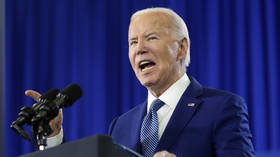What can America learn from Germany?

US President Barack Obama meet with German Chancellor Angela Merkel at the White House to discuss the global economy, foreign policy, security, and more.
The meeting was set to focus on the ongoing NATO operations in Libya and Afghanistan, the Arab Spring and democratic transitions in Egypt and Tunisia, Iran nuclear concerns, and the global economic recovery. Many feel, given Germany’s strong economic recovery and expanding economy should also be a focus, given the US is containing to stagnate and falter. Analysts have contended that Germany’s specialization and investment in innovation is driving their recovery – America has much to learn. What is Germany doing that America is not? Thom Hartmann, host of The Big Picture on RT explained that Germany operates under a different tax scheme that allows for protective economic policies which encourages domestic products and production. In addition, they boast a better work environment – including a holistic approach to leave, pay and other schemes. He explained that the system cut work hours but kept pay at the same levels, which meant people worked less hours but had the money to spend and invest in the local economy. The Germany government granted money to corporation, who in turn passed it on to their employees. The employees continue to drive and grow the local economy. “The net effect of this is that the money in the pockets of workers never changed,” he said. “The Germans understand that what really drives an economy is demand. That the real job creators are people spending money. It doesn’t matter where the money comes from.”He explained that even money from the government to the people drives the economy because the people are spending and creating demand. Germany’s economy bounced back because the system kept demand in place through the recession.In the US however the policies have not stimulated demand. The policies passed money onto companies, but not all the way down to the people. Those who do have money to drive demand are dwindling, thus the economy is unlikely to rebound. Often American politicians, namely republicans, argue that the German approach will hurt the economy, even though the evidence is to the contrary. Hartmann explained that all they need to do is look at the success and also recognize that at home, similar policies used to work for America. “Let’s look at Dwight Eisenhower. The Republican president during the time of America’s arguably, greatest growth right after World War II,” he said. During the Eisenhower administration similar policies passed money onto the people and invested in infrastructure, growth, education and the like. During that period America was in a great deal of debt, but he did not cut spending, he reinvested into other programs. “During that period of time we built this great country,” Hartmann said. “He threw money into programs like the Eisenhower highway system, schools, hospitals, look at all the buildings at ever city in America that were built in the 1950’s. And, the GI Bill – they sent people to school. They paid them a stipend, they backstopped homes. There was a housing program where you could buy a house. The consequence of this was we grew our way out of debt.”He added, “No country has even cut its way to prosperity.”Hartmann argued that America’s insistence on low taxes over high taxes does not make sense. Under Eisenhower tax rates were higher, investment was greater and America grew. Under the Reagan administration cuts were made and fewer investments were tackled. Today the country is suffering and American debt is sinking the economy.The Eisenhower approach built America, Reagan economics killed it. “When Reagan became governor of California, California had a complete free public education system. Anybody could go to college there. It was what Thomas Jefferson had in mind and created with the University of Virginia, a free education system. Let’s invest in the intellectual infrastructure,” Hartmann said. “Reagan blew that up.”America needs to return to past polices and reconsider how it engages in trade to benefit local economies, he argued. American history holds the keys to success.














